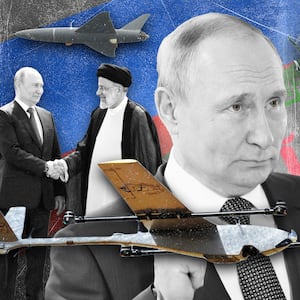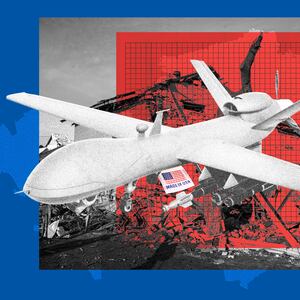Top defense officials from Belarus and Iran met in Tehran on Monday on a trip dedicated to solidifying closer military ties between the two countries.
The meeting—which took place between Belarusian Defense Minister Viktor Khrenin and Iranian Defense Minister Mohammad Reza Ashtiani—follows reports that Minsk is working to convert a manufacturing plant in Belarus to produce Shahed drones for Russia.
The two leaders signed a memorandum of understanding on Minsk-Tehran military ties during the visit, according to the Tehran Times, though it’s not clear if the two countries reached an agreement on the Shahed production.
“Belarus holds a special place in Iran’s foreign policy,” Ashtiani said.
But building Shahed drones in Belarus could contribute to Russia’s war effort in Ukraine and help alleviate some of the logistical pressures of transferring the Shahed drones to Russia.
According to a recent White House assessment, the Shahed drones Russia has been using to attack Ukrainian cities are built in Iran, then shipped across the Caspian Sea, and later transferred for use in Russia.
Iran began shipping Shahed drones to Russia last year, helping Moscow build up its arsenal of attack drones for the war in Ukraine. In return, Iran has been cooperating with Russia on missiles, electronics, and air defense, in what White House National Security Council Coordinator John Kirby called “unprecedented defense cooperation.”
“Iran is seeking to purchase additional military equipment from Russia, including attack helicopters, radars, and YAK-130 combat trainer aircraft. In total, Iran is seeking billions of dollars' worth of military equipment from Russia,” Kirby said in a briefing in June.
The potential additional production of Shahed drones in Belarus could indicate that Tehran-Moscow relations are back on track.
It would come just weeks after Moscow suggested that Iran’s dispute with the United Arab Emirates over the Hormuz Islands should be resolved through negotiations, bringing defense cooperation between Moscow and Tehran came to a head. Iran’s foreign ministry called Russia’s ambassador to Tehran to rebuke Russia’s statements, asking Moscow to “correct its position.”
The UAE claims the three islands in question as part of its territory, although the islands are governed by Iran.
“The three islands belong to Iran forever and issuing such statements contradicts Iran’s friendly relations with its neighbors,” Iran’s foreign ministry said.
Iranian Foreign Minister Hossein Amir Abdollahian, for his part, took the chance to launch some barbs toward Moscow, suggesting that Iran respects the territorial integrity of Ukraine, according to the Moscow Times.
“We believe in the territorial integrity of every country, including Ukraine, which should be the top priority for all countries, based on international law,” he said.
The Kremlin was quick to try to mend the relationship. Russia’s Deputy Foreign Minister and Special Presidential Representative for the Middle East and Africa Mikhail Bogdanov stressed to Iran’s ambassador to Moscow, Kazem Jalali, that Russia respects Iran’s sovereignty and territorial integrity. Russian Foreign Minister Sergei Lavrov later swooped in with his own reassurances.
“The Russian Federation has no doubt about the sovereignty and territorial integrity of the Islamic Republic of Iran and has fully respected it and will do it,” Lavrov told his counterpart Hossein Amir Abdollahian.
The quick turnaround suggests that Russia is aware of just how badly it needs military assistance from Iran for the war in Ukraine.
The effort to build closer Belarus-Iran ties this week could be the latest indication that work on Shahed drones’ production inside Russia is not going according plan. Russia agreed last year to bring production of the drones to Russian soil, according to U.S. intelligence.
The production process is expected to be automated in two to three years, according to the Moscow Times, and the White House has assessed that the plant will be fully operational by next year
“We have information that Russia is receiving materials from Iran needed to build a UAV (unmanned aerial vehicle) manufacturing plant inside Russia. This plant could be fully operational early next year," White House National Security Council Coordinator John Kirby said last month.
But production has so far suffered from unrealistic timelines and makeshift facilities, according to Protokol and Razvorot.








